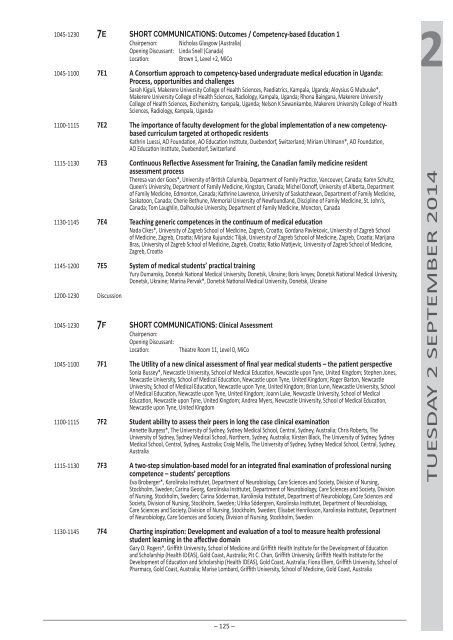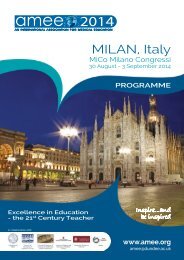Ac1xd
Ac1xd
Ac1xd
Create successful ePaper yourself
Turn your PDF publications into a flip-book with our unique Google optimized e-Paper software.
2TUESDAY 2 SEPTEMBER 20141045-1230 7E SHORT COMMUNICATIONS: Outcomes / Competency-based Education 1Chairperson: Nicholas Glasgow (Australia)Opening Discussant: Linda Snell (Canada)Location:Brown 1, Level +2, MiCo1045-1100 7E1 A Consortium approach to competency-based undergraduate medical education in Uganda:Process, opportunities and challengesSarah Kiguli, Makerere University College of Health Sciences, Paediatrics, Kampala, Uganda; Aloysius G Mubuuke*,Makerere University College of Health Sciences, Radiology, Kampala, Uganda; Rhona Baingana, Makerere UniversityCollege of Health Sciences, Biochemistry, Kampala, Uganda; Nelson K Sewankambo, Makerere University College of HealthSciences, Radiology, Kampala, Uganda1100-1115 7E2 The importance of faculty development for the global implementation of a new competencybasedcurriculum targeted at orthopedic residentsKathrin Luessi, AO Foundation, AO Education Institute, Duebendorf, Switzerland; Miriam Uhlmann*, AO Foundation,AO Education Institute, Duebendorf, Switzerland1115-1130 7E3 Continuous Reflective Assessment for Training, the Canadian family medicine residentassessment processTheresa van der Goes*, University of British Columbia, Department of Family Practice, Vancouver, Canada; Karen Schultz,Queen’s University, Department of Family Medicine, Kingston, Canada; Michel Donoff, University of Alberta, Departmentof Family Medicine, Edmonton, Canada; Kathrine Lawrence, University of Saskatchewan, Department of Family Medicine,Saskatoon, Canada; Cherie Bethune, Memorial University of Newfoundland, Discipline of Family Medicine, St. John’s,Canada; Tom Laughlin, Dalhoulsie University, Department of Family Medicine, Moncton, Canada1130-1145 7E4 Teaching generic competences in the continuum of medical educationNada Cikes*, University of Zagreb School of Medicine, Zagreb, Croatia; Gordana Pavlekovic, University of Zagreb Schoolof Medicine, Zagreb, Croatia; Mirjana Kujundzic Tiljak, University of Zagreb School of Medicine, Zagreb, Croatia; MarijanaBras, University of Zagreb School of Medicine, Zagreb, Croatia; Ratko Matijevic, University of Zagreb School of Medicine,Zagreb, Croatia1145-1200 7E5 System of medical students’ practical trainingYury Dumansky, Donetsk National Medical University, Donetsk, Ukraine; Boris Ivnyev, Donetsk National Medical University,Donetsk, Ukraine; Marina Pervak*, Donetsk National Medical University, Donetsk, Ukraine1200-1230 Discussion1045-1230 7F SHORT COMMUNICATIONS: Clinical AssessmentChairperson:Opening Discussant:Location:Theatre Room 11, Level 0, MiCo1045-1100 7F1 The Utility of a new clinical assessment of final year medical students – the patient perspectiveSonia Bussey*, Newcastle University, School of Medical Education, Newcastle upon Tyne, United Kingdom; Stephen Jones,Newcastle University, School of Medical Education, Newcastle upon Tyne, United Kingdom; Roger Barton, NewcastleUniversity, School of Medical Education, Newcastle upon Tyne, United Kingdom; Brian Lunn, Newcastle University, Schoolof Medical Education, Newcastle upon Tyne, United Kingdom; Joann Luke, Newcastle University, School of MedicalEducation, Newcastle upon Tyne, United Kingdom; Andrea Myers, Newcastle University, School of Medical Education,Newcastle upon Tyne, United Kingdom1100-1115 7F2 Student ability to assess their peers in long the case clinical examinationAnnette Burgess*, The University of Sydney, Sydney Medical School, Central, Sydney, Australia; Chris Roberts, TheUniversity of Sydney, Sydney Medical School, Northern, Sydney, Australia; Kirsten Black, The University of Sydney, SydneyMedical School, Central, Sydney, Australia; Craig Mellis, The University of Sydney, Sydney Medical School, Central, Sydney,Australia1115-1130 7F3 A two-step simulation-based model for an integrated final examination of professional nursingcompetence – students’ perceptionsEva Broberger*, Karolinska Institutet, Department of Neurobiology, Care Sciences and Society, Division of Nursing,Stockholm, Sweden; Carina Georg, Karolinska Institutet, Department of Neurobiology, Care Sciences and Society, Divisionof Nursing, Stockholm, Sweden; Carina Söderman, Karolinska Institutet, Department of Neurobiology, Care Sciences andSociety, Division of Nursing, Stockholm, Sweden; Ulrika Södergren, Karolinska Institutet, Department of Neurobiology,Care Sciences and Society, Division of Nursing, Stockholm, Sweden; Elisabet Henriksson, Karolinska Institutet, Departmentof Neurobiology, Care Sciences and Society, Division of Nursing, Stockholm, Sweden1130-1145 7F4 Charting inspiration: Development and evaluation of a tool to measure health professionalstudent learning in the affective domainGary D. Rogers*, Griffith University, School of Medicine and Griffith Health Institute for the Development of Educationand Scholarship (Health IDEAS), Gold Coast, Australia; Pit C. Chan, Griffith University, Griffith Health Institute for theDevelopment of Education and Scholarship (Health IDEAS), Gold Coast, Australia; Fiona Ellem, Griffith University, School ofPharmacy, Gold Coast, Australia; Marise Lombard, Griffith University, School of Medicine, Gold Coast, Australia– 125 –



